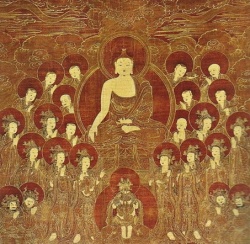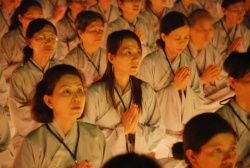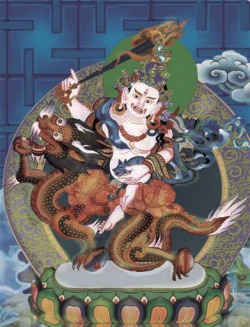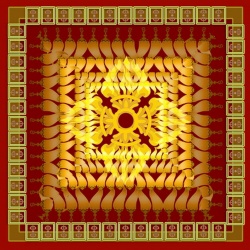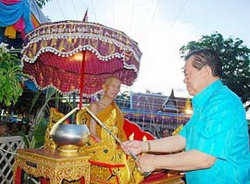Difference between revisions of "Āḷavikāsuttaṁ: The Discourse about Āḷavikā"
(Created page with "<nomobile>{{DisplayImages|2900|986|3215|1573|1074|96|2364}}</nomobile> {{Centre|<big><big> </big></big>}} <poem> 162. Evaṁ me sutaṁ: Thus I have heard: ekaṁ samayaṁ...") |
|||
| Line 1: | Line 1: | ||
<nomobile>{{DisplayImages|2900|986|3215|1573|1074|96|2364}}</nomobile> | <nomobile>{{DisplayImages|2900|986|3215|1573|1074|96|2364}}</nomobile> | ||
| − | {{Centre|<big><big> </big></big>}} | + | {{Centre|<big><big>[[Āḷavikāsuttaṁ]]<br/> The Discourse about Āḷavikā </big></big>}} |
<poem> | <poem> | ||
| Line 6: | Line 6: | ||
Thus I have heard: | Thus I have heard: | ||
| − | ekaṁ samayaṁ Bhagavā Sāvatthiyaṁ viharati | + | ekaṁ samayaṁ [[Bhagavā]] Sāvatthiyaṁ viharati |
| − | at one time the Gracious One was dwelling near Sāvatthī | + | at one time the Gracious One was dwelling near [[Sāvatthī]] |
| − | Jetavane Anāthapiṇḍikassa ārāme. | + | [[Jetavane]] Anāthapiṇḍikassa ārāme. |
| − | at Anāthapiṇḍika's grounds in Jeta's Wood. | + | at Anāthapiṇḍika's grounds in Jeta's [[Wood]]. |
| − | Atha kho Āḷavikā bhikkhunī, pubbaṇhasamayaṁ nivāsetvā, | + | Atha kho Āḷavikā [[bhikkhunī]], pubbaṇhasamayaṁ nivāsetvā, |
| − | Then the nun Āḷavikā, <ref>{{Nolinking|Comm: Āḷavikā ti Āḷaviyaṁ jātā Āḷavinagarato yeva ca nikkhamma pabbajitā; Āḷavikā means she was born in Āḷavī and she went forth from the town of Āḷavī.}}</ref> having dressed in the morning time, | + | Then the [[nun]] Āḷavikā, <ref>{{Nolinking|Comm: Āḷavikā ti Āḷaviyaṁ jātā Āḷavinagarato yeva ca nikkhamma pabbajitā; Āḷavikā means she was born in Āḷavī and she went forth from the town of Āḷavī.}}</ref> having dressed in the morning time, |
pattacīvaram-ādāya, Sāvatthiṁ piṇḍāya pāvisi. | pattacīvaram-ādāya, Sāvatthiṁ piṇḍāya pāvisi. | ||
| − | after picking up her bowl and robe, was entering Sāvatthī for alms. | + | after picking up her [[bowl]] and robe, was entering [[Sāvatthī]] for [[alms]]. |
Sāvatthiyaṁ piṇḍāya caritvā, pacchābhattaṁ piṇḍapātapaṭikkantā, | Sāvatthiyaṁ piṇḍāya caritvā, pacchābhattaṁ piṇḍapātapaṭikkantā, | ||
| − | After walking for alms in Sāvatthī, and returning from the alms-round after the meal, | + | After walking for [[alms]] in [[Sāvatthī]], and returning from the [[alms-round]] after the meal, |
yena Andhavanaṁ tenupasaṅkami vivekatthinī. | yena Andhavanaṁ tenupasaṅkami vivekatthinī. | ||
| − | she approached the Blind Man's Wood <ref>Comm: Andhavanan-ti Kassapasammāsambuddhassa cetiye navakammatthāya dhanaṁ samādapetvā, āgacchantassa Yasodharassa nāma Dhammabhāṇakassa ariyapuggalassa akkhīni uppāṭetvā, tattheva akkhibhedappattehi pañcahi corasatehi, nivutthattā tato paṭṭhāya Andhavanan-ti saṅkhaṁ gataṁ vanaṁ. Taṁ kira Sāvatthito dakkhiṇapasse gāvutamatte hoti Rājārakkhāya guttaṁ, tattha pavivekakāmā bhikkhū ca bhikkhuniyo ca gacchanti. Tasmā ayam-pi kāyavivekatthinī yena taṁ vanaṁ tenupasaṅkami. Blind Man's Wood, having taken riches for the purpose of the work on the Chetiya of the Fully Awakened Kassapa, after they tore out the eyes of the Dhamma recitor named Yasodhara, who was a Noble One, five hundred thieves lost their own sight and dwelt right there because of it, and the name Blind Man's Wood came to that wood. It seems it was around a half a league on the southern side of Sāvatthī and was guarded and protected by the King, and monks and nuns who desired seclusion would go there. Therefore seeking for bodily seclusion she approached that wood.</ref> seeking for seclusion. | + | she approached the [[Blind]] Man's [[Wood]] <ref>Comm: Andhavanan-ti Kassapasammāsambuddhassa cetiye navakammatthāya dhanaṁ samādapetvā, āgacchantassa Yasodharassa [[nāma]] Dhammabhāṇakassa ariyapuggalassa akkhīni uppāṭetvā, tattheva akkhibhedappattehi pañcahi corasatehi, nivutthattā tato paṭṭhāya Andhavanan-ti saṅkhaṁ gataṁ vanaṁ. Taṁ kira Sāvatthito dakkhiṇapasse gāvutamatte hoti Rājārakkhāya guttaṁ, tattha pavivekakāmā bhikkhū ca bhikkhuniyo ca gacchanti. Tasmā ayam-pi kāyavivekatthinī yena taṁ vanaṁ tenupasaṅkami. [[Blind]] Man's [[Wood]], having taken riches for the {{Wiki|purpose}} of the work on the [[Chetiya]] of the [[Fully Awakened]] [[Kassapa]], after they tore out the [[eyes]] of the [[Dhamma]] recitor named [[Yasodhara]], who was a [[Noble One]], five hundred thieves lost their [[own]] [[sight]] and dwelt right there because of it, and the [[name]] [[Blind]] Man's [[Wood]] came to that [[wood]]. It seems it was around a half a league on the southern side of [[Sāvatthī]] and was guarded and protected by the [[King]], and [[monks and nuns]] who [[desired]] [[seclusion]] would go there. Therefore seeking for [[bodily]] [[seclusion]] she approached that [[wood]].</ref> seeking for [[seclusion]]. |
Atha kho Māro pāpimā | Atha kho Māro pāpimā | ||
| − | Then the Wicked Māra | + | Then the Wicked [[Māra]] |
Āḷavikāya bhikkhuniyā bhayaṁ chambhitattaṁ lomahaṁsaṁ uppādetukāmo, | Āḷavikāya bhikkhuniyā bhayaṁ chambhitattaṁ lomahaṁsaṁ uppādetukāmo, | ||
| − | desiring to give rise to fear, terror, and horror in the nun Āḷavikā, | + | [[desiring]] to give rise to {{Wiki|fear}}, {{Wiki|terror}}, and [[horror]] in the [[nun]] Āḷavikā, |
| − | vivekamhā cāvetukāmo, yena Āḷavikā bhikkhunī tenupasaṅkami, | + | vivekamhā cāvetukāmo, yena Āḷavikā [[bhikkhunī]] tenupasaṅkami, |
| − | desiring to drive her out of seclusion, approached the nun Āḷavikā, | + | [[desiring]] to drive her out of [[seclusion]], approached the [[nun]] Āḷavikā, |
| − | upasaṅkamitvā Āḷavikaṁ bhikkhuniṁ gāthāya ajjhabhāsi: | + | upasaṅkamitvā Āḷavikaṁ bhikkhuniṁ gāthāya [[ajjhabhāsi]]: |
| − | and after approaching he addressed the nun Āḷavikā with a verse: | + | and after approaching he addressed the [[nun]] Āḷavikā with a verse: |
| − | : | + | :“[[Natthi]] nissaraṇaṁ loke, kiṁ vivekena kāhasi? |
| − | :“There is no escape <ref>{{Nolinking|Comm: nissaraṇan-ti nibbānaṁ, escape means Emancipation.}}</ref> from the world, why do you try with seclusion? | + | :“There is no escape <ref>{{Nolinking|Comm: nissaraṇan-ti nibbānaṁ, escape means Emancipation.}}</ref> from the [[world]], why do you try with [[seclusion]]? |
:Bhuñjassu kāmaratiyo, māhu pacchānutāpinī.” ti | :Bhuñjassu kāmaratiyo, māhu pacchānutāpinī.” ti | ||
| − | :Enjoy the sensual delights, do not be remorseful hereafter.” | + | :Enjoy the {{Wiki|sensual}} delights, do not be remorseful hereafter.” |
Atha kho Āḷavikāya bhikkhuniyā etad-ahosi: | Atha kho Āḷavikāya bhikkhuniyā etad-ahosi: | ||
| − | Then it occurred to the nun Āḷavikā: | + | Then it occurred to the [[nun]] Āḷavikā: |
“Ko nu khvāyaṁ manusso vā amanusso vā gāthaṁ bhāsatī?” ti | “Ko nu khvāyaṁ manusso vā amanusso vā gāthaṁ bhāsatī?” ti | ||
| − | “Who is this, a human or a non-human, speaking this verse?” | + | “Who is this, a [[human]] or a {{Wiki|non-human}}, {{Wiki|speaking}} this verse?” |
Atha kho Āḷavikāya bhikkhuniyā etad-ahosi: | Atha kho Āḷavikāya bhikkhuniyā etad-ahosi: | ||
| − | Then it occurred to the nun Āḷavikā: | + | Then it occurred to the [[nun]] Āḷavikā: |
“Māro kho ayaṁ Pāpimā | “Māro kho ayaṁ Pāpimā | ||
| − | “This is the Wicked Māra | + | “This is the Wicked [[Māra]] |
mama bhayaṁ chambhitattaṁ lomahaṁsaṁ uppādetukāmo, | mama bhayaṁ chambhitattaṁ lomahaṁsaṁ uppādetukāmo, | ||
| − | desiring to give rise to fear, terror, and horror in me, | + | [[desiring]] to give rise to {{Wiki|fear}}, {{Wiki|terror}}, and [[horror]] in me, |
vivekamhā cāvetukāmo gāthaṁ bhāsatī.” ti | vivekamhā cāvetukāmo gāthaṁ bhāsatī.” ti | ||
| − | desiring to drive me out of seclusion, who speaks this verse.” | + | [[desiring]] to drive me out of [[seclusion]], who speaks this verse.” |
| − | Atha kho Āḷavikā bhikkhunī: Māro ayaṁ Pāpimā iti viditvā, | + | Atha kho Āḷavikā [[bhikkhunī]]: Māro ayaṁ Pāpimā iti viditvā, |
| − | Then the nun Āḷavikā having understood: This is the Wicked Māra, | + | Then the [[nun]] Āḷavikā having understood: This is the Wicked [[Māra]], |
Māraṁ Pāpimantaṁ gāthāhi paccabhāsi: | Māraṁ Pāpimantaṁ gāthāhi paccabhāsi: | ||
| − | replied with this verse to the Wicked Māra: | + | replied with this verse to the Wicked [[Māra]]: |
| − | + | “[[Atthi]] nissaraṇaṁ loke, [[paññāya]] me suphussitaṁ, | |
| − | “There is an escape from the world, which I have attained through wisdom, <ref>{{Nolinking|Comm: paññāyā ti paccavekkhaṇañāṇena; through wisdom means through reflection knowledge (reflection on her attainment). }}</ref> | + | “There is an escape from the [[world]], which I have [[attained]] through [[wisdom]], <ref>{{Nolinking|Comm: paññāyā ti paccavekkhaṇañāṇena; through wisdom means through reflection knowledge (reflection on her attainment). }}</ref> |
Pamattabandhu Pāpima, na tvaṁ jānāsi taṁ padaṁ, | Pamattabandhu Pāpima, na tvaṁ jānāsi taṁ padaṁ, | ||
| − | You do not know that state, <ref>{{Nolinking|Comm: na tvaṁ jānāsi taṁ padan-ti tvaṁ etaṁ Nibbānapadaṁ vā Nibbānagāmimaggapadaṁ vā na jānāsi; you do not know that state means you do not know the state of Emancipation or the path going to Emancipation.}}</ref> you Wicked one, kin of the heedless, | + | You do not know that [[state]], <ref>{{Nolinking|Comm: na tvaṁ jānāsi taṁ padan-ti tvaṁ etaṁ Nibbānapadaṁ vā Nibbānagāmimaggapadaṁ vā na jānāsi; you do not know that state means you do not know the state of Emancipation or the path going to Emancipation.}}</ref> you Wicked one, kin of the heedless, |
| − | Sattisūlūpamā kāmā, khandhāsaṁ adhikuṭṭanā, | + | Sattisūlūpamā [[kāmā]], khandhāsaṁ adhikuṭṭanā, |
| − | Sensual pleasures are like an axe, <ref>{{Nolinking|Comm: sattisūlūpamā ti vinivijjhanatthena sattisūlasadisā; like an axe means the same as an axe the purpose of which is to pierce through.}}</ref> the constituent parts (like) the block, <ref>{{Nolinking|Comm: khandhāsaṁ adhikuṭṭanā ti khandhā tesaṁ adhikuṭṭanabhaṇḍikā; the constituent parts (are like) the block means those constituents are like a heap on a block.}}</ref> | + | [[Sensual pleasures]] are like an axe, <ref>{{Nolinking|Comm: sattisūlūpamā ti vinivijjhanatthena sattisūlasadisā; like an axe means the same as an axe the purpose of which is to pierce through.}}</ref> the constituent parts (like) the block, <ref>{{Nolinking|Comm: khandhāsaṁ adhikuṭṭanā ti khandhā tesaṁ adhikuṭṭanabhaṇḍikā; the constituent parts (are like) the block means those constituents are like a heap on a block.}}</ref> |
| − | Yaṁ tvaṁ kāmaratiṁ brūsi, arati mayha' sā ahū.” ti | + | Yaṁ tvaṁ kāmaratiṁ brūsi, [[arati]] mayha' sā ahū.” ti |
| − | That which you say is sensual delight, in that for me there is no delight.” | + | That which you say is {{Wiki|sensual}} [[delight]], in that for me there is no [[delight]].” |
| − | Atha kho Māro Pāpimā: | + | Atha kho Māro Pāpimā: “[[Jānāti]] maṁ Āḷavikā [[bhikkhunī]]!” ti |
| − | Then the Wicked Māra (thought): “The nun Āḷavikā knows me!” | + | Then the Wicked [[Māra]] ([[thought]]): “The [[nun]] Āḷavikā [[knows]] me!” |
dukkhī dummano tatthevantaradhāyī ti. | dukkhī dummano tatthevantaradhāyī ti. | ||
| − | and pained and depressed he vanished right there. | + | and pained and {{Wiki|depressed}} he vanished right there. |
</poem> | </poem> | ||
Latest revision as of 13:11, 16 May 2015
Āḷavikāsuttaṁ
The Discourse about Āḷavikā
162. Evaṁ me sutaṁ:
Thus I have heard:
ekaṁ samayaṁ Bhagavā Sāvatthiyaṁ viharati
at one time the Gracious One was dwelling near Sāvatthī
Jetavane Anāthapiṇḍikassa ārāme.
at Anāthapiṇḍika's grounds in Jeta's Wood.
Atha kho Āḷavikā bhikkhunī, pubbaṇhasamayaṁ nivāsetvā,
Then the nun Āḷavikā, [1] having dressed in the morning time,
pattacīvaram-ādāya, Sāvatthiṁ piṇḍāya pāvisi.
after picking up her bowl and robe, was entering Sāvatthī for alms.
Sāvatthiyaṁ piṇḍāya caritvā, pacchābhattaṁ piṇḍapātapaṭikkantā,
After walking for alms in Sāvatthī, and returning from the alms-round after the meal,
yena Andhavanaṁ tenupasaṅkami vivekatthinī.
she approached the Blind Man's Wood [2] seeking for seclusion.
Atha kho Māro pāpimā
Then the Wicked Māra
Āḷavikāya bhikkhuniyā bhayaṁ chambhitattaṁ lomahaṁsaṁ uppādetukāmo,
desiring to give rise to fear, terror, and horror in the nun Āḷavikā,
vivekamhā cāvetukāmo, yena Āḷavikā bhikkhunī tenupasaṅkami,
desiring to drive her out of seclusion, approached the nun Āḷavikā,
upasaṅkamitvā Āḷavikaṁ bhikkhuniṁ gāthāya ajjhabhāsi:
and after approaching he addressed the nun Āḷavikā with a verse:
“Natthi nissaraṇaṁ loke, kiṁ vivekena kāhasi?
“There is no escape [3] from the world, why do you try with seclusion?
Bhuñjassu kāmaratiyo, māhu pacchānutāpinī.” ti
Enjoy the sensual delights, do not be remorseful hereafter.”
Atha kho Āḷavikāya bhikkhuniyā etad-ahosi:
Then it occurred to the nun Āḷavikā:
“Ko nu khvāyaṁ manusso vā amanusso vā gāthaṁ bhāsatī?” ti
“Who is this, a human or a non-human, speaking this verse?”
Atha kho Āḷavikāya bhikkhuniyā etad-ahosi:
Then it occurred to the nun Āḷavikā:
“Māro kho ayaṁ Pāpimā
“This is the Wicked Māra
mama bhayaṁ chambhitattaṁ lomahaṁsaṁ uppādetukāmo,
desiring to give rise to fear, terror, and horror in me,
vivekamhā cāvetukāmo gāthaṁ bhāsatī.” ti
desiring to drive me out of seclusion, who speaks this verse.”
Atha kho Āḷavikā bhikkhunī: Māro ayaṁ Pāpimā iti viditvā,
Then the nun Āḷavikā having understood: This is the Wicked Māra,
Māraṁ Pāpimantaṁ gāthāhi paccabhāsi:
replied with this verse to the Wicked Māra:
“Atthi nissaraṇaṁ loke, paññāya me suphussitaṁ,
“There is an escape from the world, which I have attained through wisdom, [4]
Pamattabandhu Pāpima, na tvaṁ jānāsi taṁ padaṁ,
You do not know that state, [5] you Wicked one, kin of the heedless,
Sattisūlūpamā kāmā, khandhāsaṁ adhikuṭṭanā,
Sensual pleasures are like an axe, [6] the constituent parts (like) the block, [7]
Yaṁ tvaṁ kāmaratiṁ brūsi, arati mayha' sā ahū.” ti
That which you say is sensual delight, in that for me there is no delight.”
Atha kho Māro Pāpimā: “Jānāti maṁ Āḷavikā bhikkhunī!” ti
Then the Wicked Māra (thought): “The nun Āḷavikā knows me!”
dukkhī dummano tatthevantaradhāyī ti.
and pained and depressed he vanished right there.
Footnotes
- ↑ Comm: Āḷavikā ti Āḷaviyaṁ jātā Āḷavinagarato yeva ca nikkhamma pabbajitā; Āḷavikā means she was born in Āḷavī and she went forth from the town of Āḷavī.
- ↑ Comm: Andhavanan-ti Kassapasammāsambuddhassa cetiye navakammatthāya dhanaṁ samādapetvā, āgacchantassa Yasodharassa nāma Dhammabhāṇakassa ariyapuggalassa akkhīni uppāṭetvā, tattheva akkhibhedappattehi pañcahi corasatehi, nivutthattā tato paṭṭhāya Andhavanan-ti saṅkhaṁ gataṁ vanaṁ. Taṁ kira Sāvatthito dakkhiṇapasse gāvutamatte hoti Rājārakkhāya guttaṁ, tattha pavivekakāmā bhikkhū ca bhikkhuniyo ca gacchanti. Tasmā ayam-pi kāyavivekatthinī yena taṁ vanaṁ tenupasaṅkami. Blind Man's Wood, having taken riches for the purpose of the work on the Chetiya of the Fully Awakened Kassapa, after they tore out the eyes of the Dhamma recitor named Yasodhara, who was a Noble One, five hundred thieves lost their own sight and dwelt right there because of it, and the name Blind Man's Wood came to that wood. It seems it was around a half a league on the southern side of Sāvatthī and was guarded and protected by the King, and monks and nuns who desired seclusion would go there. Therefore seeking for bodily seclusion she approached that wood.
- ↑ Comm: nissaraṇan-ti nibbānaṁ, escape means Emancipation.
- ↑ Comm: paññāyā ti paccavekkhaṇañāṇena; through wisdom means through reflection knowledge (reflection on her attainment).
- ↑ Comm: na tvaṁ jānāsi taṁ padan-ti tvaṁ etaṁ Nibbānapadaṁ vā Nibbānagāmimaggapadaṁ vā na jānāsi; you do not know that state means you do not know the state of Emancipation or the path going to Emancipation.
- ↑ Comm: sattisūlūpamā ti vinivijjhanatthena sattisūlasadisā; like an axe means the same as an axe the purpose of which is to pierce through.
- ↑ Comm: khandhāsaṁ adhikuṭṭanā ti khandhā tesaṁ adhikuṭṭanabhaṇḍikā; the constituent parts (are like) the block means those constituents are like a heap on a block.

